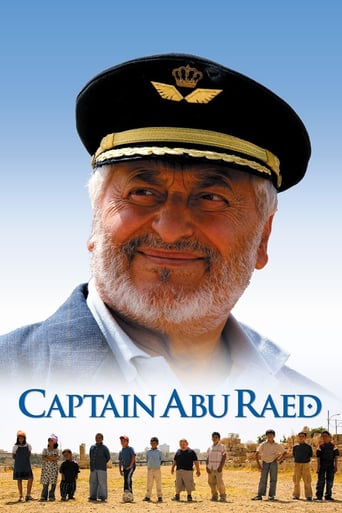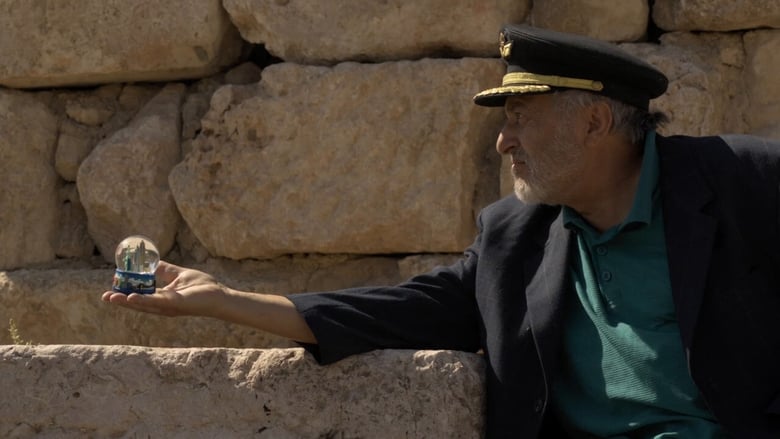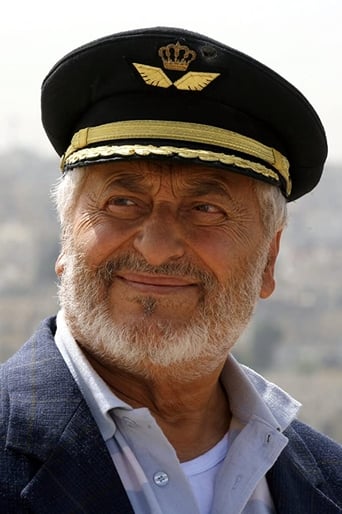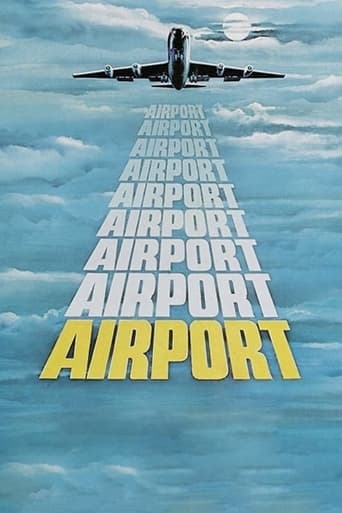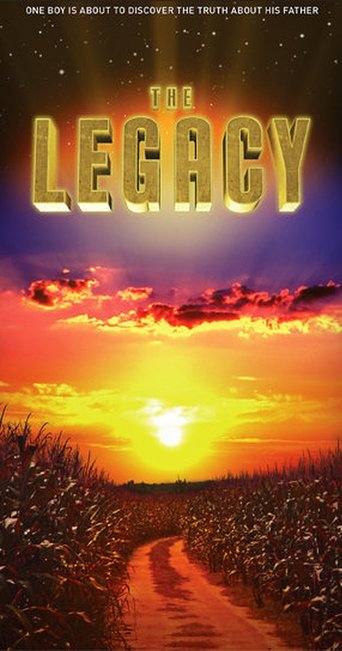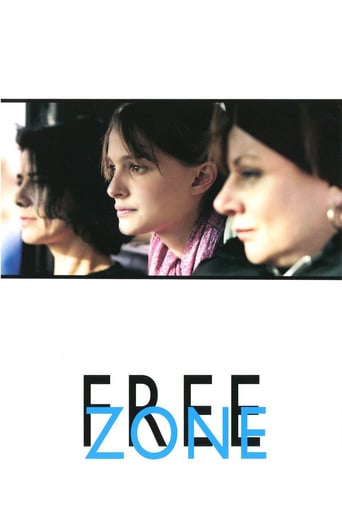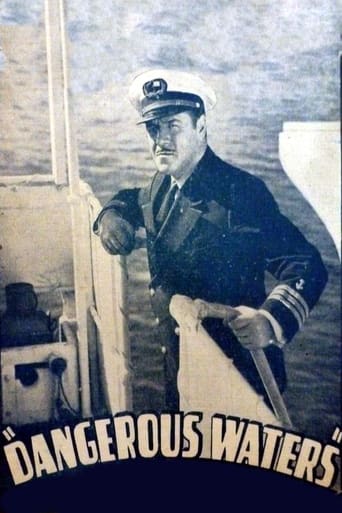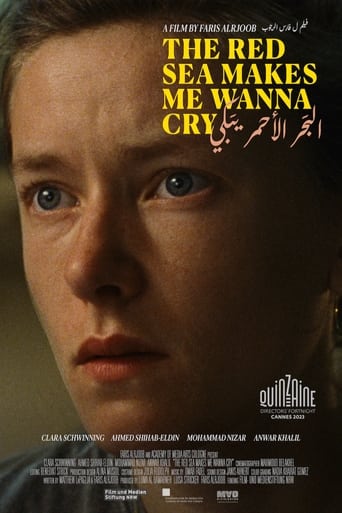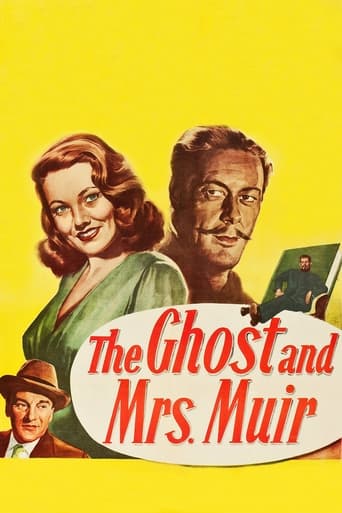Captain Abu Raed (2009)
Abu Raed is an old airport janitor who has always yearned to travel the world but has never been able to afford it. One day, he finds an old discarded pilot's hat, and discovers a calling: a group of children in his poor neighborhood assume he's an airline captain and beg him to share stories of the world outside of Amman, Jordan. Through imaginary tales, a friendship forms, and Abu Raed is soon faced with the grim realities of the children's home life. Thus he takes it upon himself to make a difference in their lives.
Watch Trailer
Cast
Similar titles

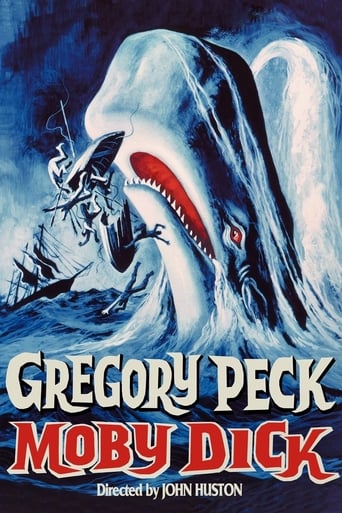
Reviews
Fantastic!
Absolutely the worst movie.
As somebody who had not heard any of this before, it became a curious phenomenon to sit and watch a film and slowly have the realities begin to click into place.
There's no way I can possibly love it entirely but I just think its ridiculously bad, but enjoyable at the same time.
First of all the film Captain Abu Raed is unexceptional. I am also one of those people who have to take into consideration the director behind the film. I am disappointed with Amin Matalqa's reply to a comment by Elia.Mr. Matalqa claims his film is Jordanian because it's 100% Jordanian funded. Does that mean other Jordanian films who were denied funding by local Jordanian sources because they don't have Mr. Matalqa's connections that those films are not Jordanian films? Famous Jordanian director Mahmoud Massad, maker of the award-wining documentary Recycle (winner of Sundance World Cinematography Award) did not receive a penny of support in Jordan. So he won a few funding competitions at the Berlinale World Cinema Fund and San Sebastian. Mr. Matalqa wants to tell us that Mr. Mahmoud Massad's film is not Jordanian. That's fantastic. So all a third world regime has to do is to make laws forbidding funding for filmmakers they don't like and that makes these black-listed films foreign films? I am glad film festivals do not go by Mr. Matalqa's definition of a national film.Then Mr. Matalqa attacks Najdat Anzour's film Oriental Tale (1991) accusing it of not being a Jordanian film because Mr. Anzour is not Jordanian. But the actors and the script and the shooting location are Jordanians. And by the way, Najdat Anzour has the Jordanian passport. That makes him Jordanian as well as Syrian.But even if the film follows the nationality of the filmmaker, does that mean all of Roman Polanski's films are French or Polish? There are other Hollywood filmmakers who are not American. Yet there films classify as Americans. Mr. Matalqa wants to change all of that just for his film's sake and to exclude other Jordanian films and filmmakers from the spot light. Too drastic.Mr. Matalqa claims that because a film is French funded, that it's not Jordanian. That means 90% of films made in the third world are French or German or Italian films? What about countries that can't afford to fund films. What about repressive regimes who ban funding for filmmakers critical of the status quo? It would be a great day for repression if Mr. Matalqa gets his way with his new funding criteria and national identity.As for the Jordanian feature film the Mission (2007), again Mr. Matalqa insults the filmmakers by making fantastic statements as to why his film is still number one. He says "The Mission was filmed in July 2007, one month after Captain Abu Raed" So? it was screened before Captain Abu Raed in Jordan. This must be a new role where the film's year of production is decided by the day the camera starts rolling for the first time."and was never released in cinemas nor festivals." Another bizarre rule Mr. Matalqa invented. Many films screen in art houses and cultural centers and not paid commercial theaters. They still count as films. They still exist. The Mission is a film that was made and screened in Jordan in more than one cultural center under the patronage of royalty. It's a real film."I also understand it was shot with TV video cameras" Again, Mr. Matalqa denigrates the film because of the limited means of the filmmaker. We know of films that had won international acclaim that shot with a simple video camera. That's the whole idea behind Dogme 95 and other film-making schools. Even Oliver Stone used a TV video camera to make some of his great films.Mr. Matalqa is so eager to monopolize the spotlight that he is willing to hurt so many other filmmakers and to change the whole international system by which films are classified and judged. Wouldn't be much easier to make a good film and leave us to decide? I hope Mr. Matalqa changes his stance instead of digging deeper and deeper and offending more and more people.It's all about the quality of the film. So give it a rest Mr. Matalqa.
The filmmaker's cut-throat approach to promoting his film has raised a few eyebrows. Matalqa in numerous interviews claims his film is the first Jordanian feature film in 50 or 30 years. But the truth is two feature films were made in Jordan: The Mission in 2007 and Oriental Tale in 1991. I don't see why it's necessary to try to erase other people's accomplishments to make a name for himself. Why not continue the journey that others have started instead of undermining their legacy. As for the film itself, it's not technically weak but it's not a memorable film. What's noticeable about the film is the presence of so many actors who work in official institutions in Jordan such as employees or former employees of various cultural organizations such as Ali Maher of the Royal Film Commission, Lina Attal (head of Queen Nour Performing Arts Center), Dina Raad (ex-manager at the Royal Film Commission), Phaedra Dahdaleh (ex-Royal Film Commission employee) and others, Rana Sultan (Jordan Government TV presenter). Yet this film is being promoted as an independent film.
I saw this movie at Sundance 2008 and was thrilled to learn that it was showing at the AFI Film Festival in Dallas. I didn't hesitate for a second to buy a 2nd ticket! Once it's released in theaters, I'll be purchasing my third ticket and insisting that my friends attend with me. We were lucky enough to hear the director speak at both showings which added so much to the experience. Learning that most of the children were cast from children who were living in a refugee camp was quite surprising. The performances of the children were first rate. Nadim Sawalha who played Captain Abu Raed was outstanding as well. In addition, the backdrop for the movie - Amman - was magical. This movie is a must see!
I went to see the film just out of curiosity. I was in for a surprise - a rather pleasant one. This is a great movie from many a viewpoint. The actors, the subject, the photography, the editing and the atmosphere. Looking at it as the first Jordanian feature film (even though many of those who worked on it are not Jordanian) I find it truly great. Looking at it globally, as an international film, I still find it well above average - much better anyway than many low grade Hollywood movies. I only have two regrets. The film would have had an even greater impact if it was some 20 or 25 minutes shorter. The music: although beautiful, well interpreted and recorded, it does not seem very appropriate for such an intimate film; by moments at least. It seems to have been composed for some kind of huge, mega production the likes of Gladiator or Troy and such. Other than that it is, again, a very fine movie and I truly enjoyed it.
